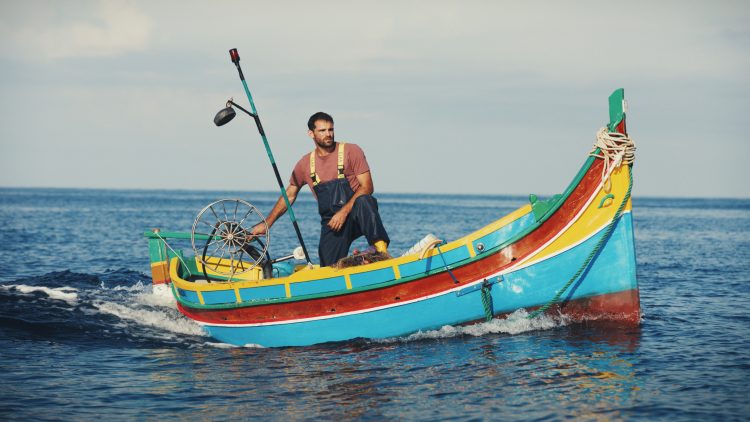“Luzzu”, Alex Camilleri’s feature-film debut, is named after a particular traditional fishing boat used in the Maltese islands. In the film, Camilleri focuses on one specific luzzu. It is Jesmark’s, a young fisherman who has inherited his boat from generations of men in his family. Jesmark ekes out a tentative living for himself with his boat, but the world is changing and making a living by fishing has become increasingly difficult. It’s especially difficult for the newly married man, who has an infant child. A leak in his boat comes to take on foreboding metaphorical resonance and over the course of the 90-minute running-time Camilleri turns “Luzzu” into a moving, bleak picture of a man coming to grips with the reality of adapting to a world that seems to have no place for him.
“Luzzu” is the kind of film that makes film festivals valuable. This kind of tender, self-effacing filmmaking with small but incisive interests might fall by the way amidst the commercial demands of the film industry. But Sundance’s interest in small dramas like this is a reminder of the ways that filmmakers outside of the major metropolises are offering valuable and thoughtful engagement with potent themes. Camilleri’s account of the film’s production process at a recent Q&A for the film reflects his interest in verisimilitude.

The two main fishermen of the film, Jesmark and his colleague David, are two non-actors that Camilleri worked with, rewriting parts of the script to reflect their own natural cadence. That naturalism is a critical part of what is at work in “Luzzu”. The film’s presentation of a Maltese town, on the brinks of a battle between tradition and modernity retains small-town concerns with little hint of affectation. Instead, Camilleri hews close to a style that recalls early days of Italian neorealism, a style that was central to his own conception of cinema.
The specificity of this Maltese tale is rendered with such care but it also reflects complications which have come to define the current world-situation. As Jesmark struggles to navigate a life as a family man and a fisherman, the film brings us to a point of crisis that forces difficult questions. This is very much a film about this specific man trying to eke out this particular life. But there are larger points being made here about the world we live in and about climate change and the relationship to capitalism. It’s that last pair that make the work in Luzzu feel so evocative. Luzzu has not been the only film at Sundance to engage with our responsibility to nature and the ways that that relationship can go awry.
The naturalistic, improvisational way that “Luzzu” was created makes sense. Every nuance of the camera reflects a film that is teeming with empathy. These are familiar beats and a familiar structure in service of something specifically engaged in recognising the humanity of persons that rarely come to the fore of cinema – studio or independent. And Camilleri has found a find for the ages in Jesmark Scicluna in the leading role. He won the World Cinema Dramatic Special Jury Award in Acting at Sundance, and it’s easy to see why. The melancholy behind his eyes seems suffused in his every moment, and Camilleri understands the way that this character must unfold as neither heroic aggressor nor victimised sad-sack. He is no more, but critically no less, than a man who has found himself wrestling with the realisation that the traditions that he holds fast to may not love him back with the same fervour.
Cinematographer Léo Lefèvre conjures images of naturalistic beauty from the landscape. This is not the unblemished picaresque of idealised seaside. Instead, it is a gentle caress of the land that recognises its ambivalent beauty. Alluring but unrelenting. The stretches that overlook the water (and the clarity of the town) establish the ways that Jesmark exists within a particular structure and livelihood. To break away from that is easier said than none.
There have been a few endings that recognise the messy ambiguity of life at Sundance this year, and “Luzzu” gives us one of the best. Camilleri’s recognition of the way that growth and development can be trapped in cycles of familiarity and tradition packs a punch to the gut. The charming smallness of the focus belies an awareness of the larger world, without a preciousness, that marks the best of World Cinema. This is profound and thoughtful filmmaking that intersects with current preoccupations of cinema – masculinity, our unrelenting battle with isolation, the changing climate and our desperate attempt to leave in a mark in the world when our importance is so finite. “Luzzu” is a small miracle with specific intentions, but it is no less moving for that. It’s one of the triumphs of this year’s festival.
Luzzu premiered in the World Cinema Dramatic Competition category at the 2021 Sundance Film Festival.





